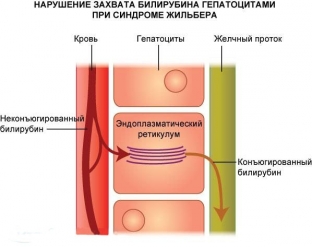Recently, genetic and autoimmune diseases have become very widespread, which are often also genetically determined. Such diseases and syndromes are difficult to treat, since there is no specific treatment. Medicine has learned to deal with some of the symptoms of genetic and autoimmune & nbsp; diseases, and recommendations have been developed to prevent the acute development of the process. There are diseases that the patient may not know about at all. Often diseases appear spontaneously or are accidentally detected during testing. One such situation is Gilbert's syndrome.
The main causes of Gilbert's syndrome
Gilbert's syndrome is a disease that is inherited. The gene responsible for the enzyme glucuronyltransferase, which is involved in the process of conjugation of bilirubin, is mutated in Gilbert's syndrome. The syndrome can develop at any age and is manifested by yellowness of the skin, mucous membranes and sclera. The disease is inherited in an autosomal recessive manner. For the debut of Gilbert's syndrome, factors are needed that provoke the onset of jaundice. This is:
- Excessive exercise.
- Injuries, surgeries.
- Stressful situations.
- Drinking alcohol.
- Viral and colds.
- Taking certain medications for a long time.
- Poor nutrition – starvation, diet, abuse of fatty and fried foods.
A person with the appearance of provoking factors may already have increased bilirubin in the blood, but he will not feel and see it, since up to a certain level of bilirubin, the skin and mucous membranes do not turn yellow.
Causes of elevated bilirubin in Gilbert's syndrome
With a defect in the production of the enzyme glucuronyl transferase, bilirubin, or rather about a third of the total bilirubin, cannot contact it and enter into a conjugation reaction. As a result, this bilirubin in an unconjugated state enters the bloodstream and is distributed to all tissues of the body. As a rule, bilirubin is not elevated much, the figure ranges from 20 to 85 µmol / l. Elevated bilirubin in the blood is not accompanied by dysfunction of the liver cells. In bile, the content of bilirubin monoglucuronide and diglucuronide increases. In order for the syndrome to develop, the presence of such hidden factors as latent hemolysis and impaired transport of bilirubin in the liver is necessary. This may be due to a binding defect in the liver of bilirubin. In this case, conjugation of bilirubin does not occur again.
Several methods for diagnosing Gilbert's syndrome
In order to make a diagnosis of Gilbert's syndrome, it is important to make a differential diagnosis. Many samples are used for this.
Methods for diagnosing Gilbert's syndrome:
- Bilirubin concentration test after taking phenobarbital, which activates liver enzymes and leads to a decrease in bilirubin levels.
- Bilirubin level test after intravenous injection of nicotinic acid. Nicotinic acid reduces the osmotic resistance of red blood cells and provokes an increase in the level of bilirubin.
- A fasting test that raises the level of bilirubin in the blood.
- Taking liver cells for a biopsy - detection of a decrease in the concentration of conjugating enzymes.
- Stool test for stercobilin.
- DNA analysis of uridine diphosphate - glucuronyltransferase.
The presence of Gilbert's syndrome can be suspected based on the results of a general and biochemical blood test, urinalysis, abdominal ultrasound.
Complications and measures to prevent the onset of Gilbert's syndrome
Gilbert's syndrome does not threaten with severe course and dangerous consequences, however, the presence of the syndrome is a contraindication for military service. With the constant presence of provoking factors, Gilbert's syndrome is constantly present, which can lead to the development of chronic hepatitis, gallstone disease, choledocholithiasis.
It is possible to prevent the manifestations of Gilbert's syndrome by adhering to some rules in nutrition and lifestyle:
- Fatty, non-natural foods should be avoided in the diet;
- consume foods high in fiber;
- completely eliminate alcohol and other bad habits;
- physical activity should be moderate;
- in the presence of chronic gastritis, peptic ulcer, undergo timely medical examination;
- eat 6 times a day in small portions to improve the outflow of bile;
- avoid stressful situations.
If a person develops jaundice in Gilbert's syndrome, treatment is symptomatic. Barbiturates are prescribed, as their effectiveness has been proven in the process of reducing the level of bilirubin in the blood. Choleretic drugs, cholekinetics, hepatoprotectors, enterosorbents, phototherapy, and, if necessary, antiemetics are used.
Gilbert's syndrome has no specific prevention and treatment, as it is inherited in an autosomal recessive manner. But a person who observes such a lifestyle may never know about his genetic defect at all.








Add a comment